One More Vital Reason Why Community Gives Me Hope
A week or so ago, I was the closing speaker at the final XOXO Fest in Portland, which was a huge honor. I was asked to come talk about reasons to have hope for the future, and in particular the ways that community gives me hope — which is obviously a topic very close to my heart.
Last week, I shared some stuff I had cut out of the talk — but now, here’s the actual text of the talk I gave, along with a few of my slides. (Making slides is hard! Who knew?)
Hi! I wrote a book a few years ago called Never Say You Can't Survive, about using creative writing to get through hard times. I believe that the act of making up stories, creating imaginary friends, getting lost in the fictional worlds you create, can help you make it through some really scary shit.
In fact, I'm here in one piece right now because I've been writing a ton of utterly bizonktastic fiction and comics. I wrote a whole young adult trilogy about queer teenagers fighting space fascists! And I co-created a trans superhero named Escapade for Marvel Comics, and basically I've been goofing around.
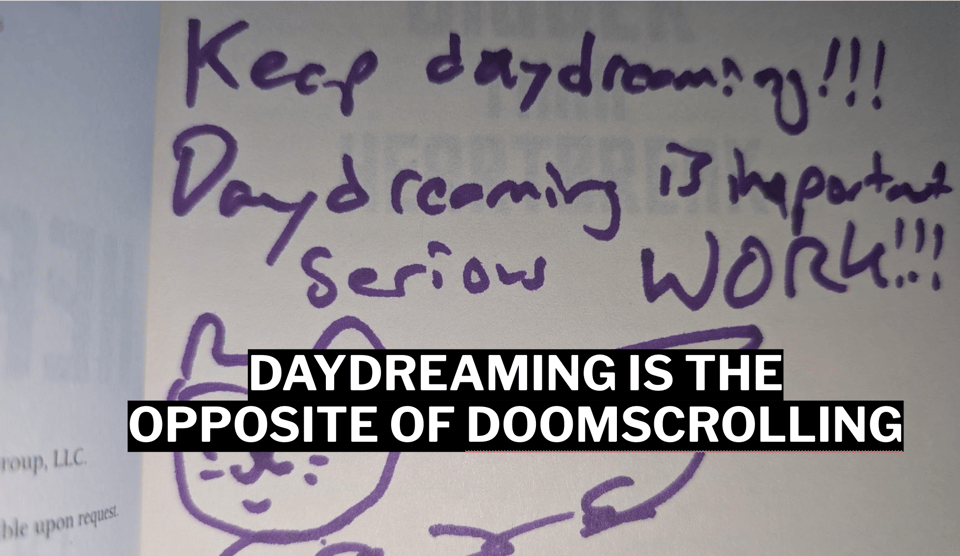
Lately when I sign books for people, I often write the same phrase: "Keep daydreaming. Daydreaming is important, serious WORK." And I usually add a terrible cat picture.
My motto these days is that daydreaming is the opposite of doomscrolling. So I absolutely believe creativity can save us — and help us save each other. And yet, nothing could have prepared me for the time we're living through right now.
My books are banned in a handful of places, and trans healthcare is becoming illegal in even more places. You honestly can't know what this feels like, until it happens to you. My words and my body are both outlawed.
And I'm bombarded with rhetoric about how my very existence is dangerous. Seeing this image of a dumpster full of queer books outside New College in Florida felt like a slow kick in the solar plexus.
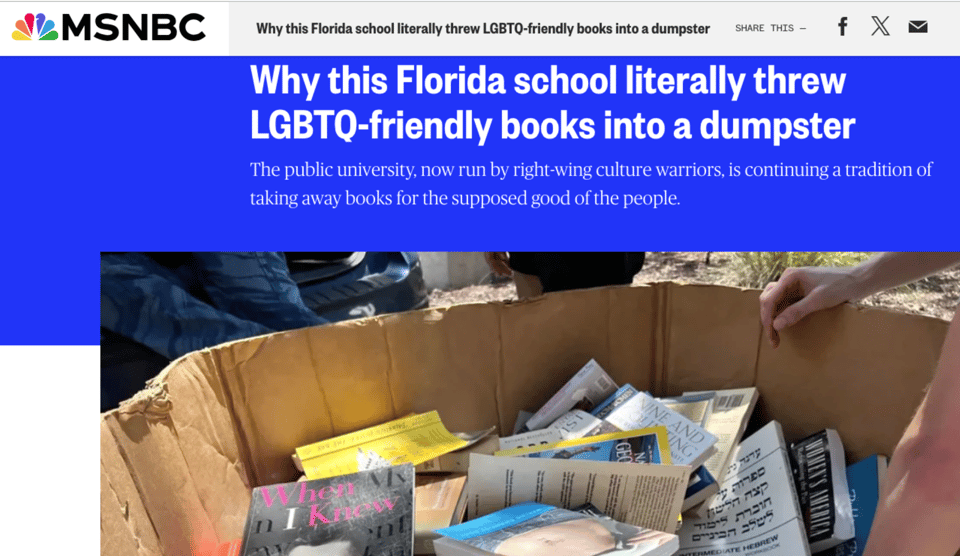
Before I talk about what gives me hope right now, I need to put a finger on what takes hope away, for me personally. And it's 100 percent when I get a feeling of learned helplessness: the sense that there's nothing we can do — when there's actually a lot we can do. In the case of the transphobic moral panic I just mentioned, I know that it would be so easy for everyone to accept the wealth of evidence that trans kids deserve recognition and support.
This shouldn't be difficult!
And yet, when a mob of pundits and big media outlets keep pushing fear-mongering narratives about us, and shout over us when we try to offer actual facts and useful perspective, it's so easy to feel helpless.
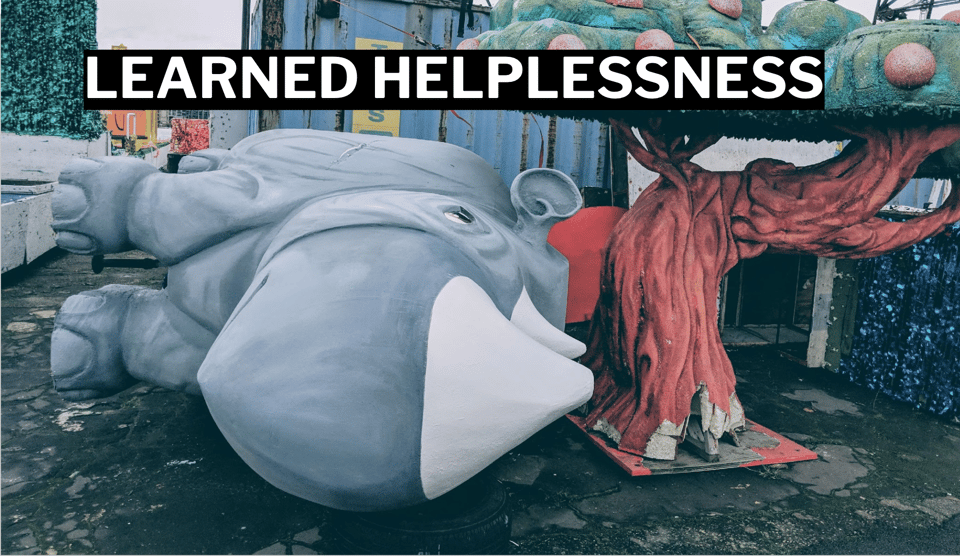
So when I say that community gives me hope, I'm not only talking about mutual aid, sharing resources and ideas, lifting each other up and creating spaces for people to thrive — though I am absolutely talking about those things, which are vital and essential.
But another huge reason I love community is because it helps us build a consensus reality, something that is sometimes dismissed as "filter bubbles" but is actually a powerful form of organizing and rallying. When I gather with other trans people, we share a consensus that trans people deserve healthcare and human rights — and over time, we can convince cis allies to share that reality, until it becomes a mainstream belief.
I only do two things in my life: I write stuff, and I organize local events. And in both cases, I’m doing the same thing: I am creating a version of reality that I want people to live inside for a while.
I'm constantly aware that I never do any of this on my own: as an author, I rely on a ton of people to help make my stories better and also I rely on readers to make the words come to life inside their own brains. As an event organizer, I'm collaborating with every single person who shows up.
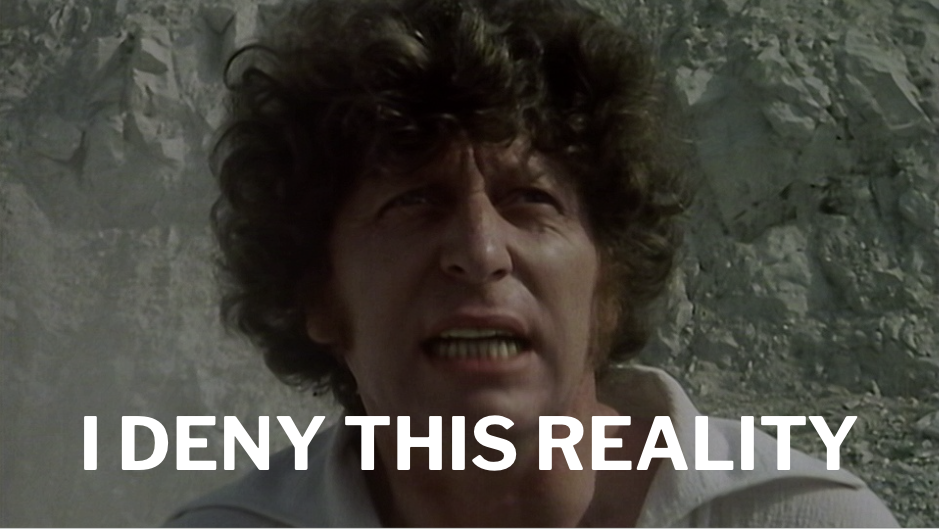
And the process of creating a consensus reality is not functionally different from the process of imagining the future. Any time you're describing the present, you're also implicitly defining the future you want to see, as well as the future you're scared of seeing.
Communities are a crucial part of futurism. And futurism needs to center communities.
So here are some principles for thinking about the future through a community-focused lens.
1) Community is made of the temporary
Like I said before, I do two things in my life: I write stories, and I organize shindigs. I've published half a dozen novels, with a seventh on the way next year, and I've done a ton of journalism, like I used to help edit a blog called io9.
And meanwhile, I organize the monthly Trans Nerd Meet Up, a monthly hangout for anyone who self-identifies as gender-nonconforming and likes to geek out. And I help to run the Bookstore and Chocolate Crawl, a regular event where we visit a bunch of local bookstores and buy books, eating chocolate along the way. And I sometimes still do Writers With Drinks, a spoken word "variety show" where I make up silly fictional bios for the readers.
In the past, I've organized one-off events like the Ballerina Pie Fight, which is just what it sounds like: a dozen ballerinas throwing pies at each other.
I trace my evolution as a writer and as a queerdo through all the scenes I've belonged to in my life: when I first moved to the SF Bay Area in 1999, I got involved with the Cacophony Society and a bisexual magazine called Anything That Moves. In the early 2000s, I was lucky to be part of a queer literary scene alongside some absolute legends. I could go on and on — these beautiful moments popped like bubbles, but new things always come along to replace them.
Everybody knows that when you organize a literary event or a party, it's amazing and then it's gone, it starts receding into the collective memory the very next day. But we have this idea that books and other writing live on forever. Increasingly, though, I feel as though both parties and books fade from memory — and that's mostly a good thing.
One of my favorite authors is Doris Lessing, who won the Nobel Prize for literature in 2007. (Seriously, watch this video. She gets out of a taxi with all her grocery shopping, and a reporter ambushes her to tell her she’s won the Nobel Prize for literature, and her response is, “Oh Christ.” She seems mostly annoyed that she can’t take her groceries inside. Later in the video, we learn that Lessing once turned down the chance to become Dame Doris Lessing, on the grounds that the whole business was “a bit pantomimey.”)
Anyway, Lessing died in 2013. A few years after that, I was speaking to a group of librarians, and I mentioned her name — and I was shocked to see a room full of blank stares. None of these professional book nerds knew who she was.
When I started trying to write science fiction and fantasy in the 1990s, I was given a laundry list of authors that everyone must read in order to understand the genre, and most of those authors have utterly vanished from the conversation in the past twenty five years. We have new leading lights, and that’s a good thing.
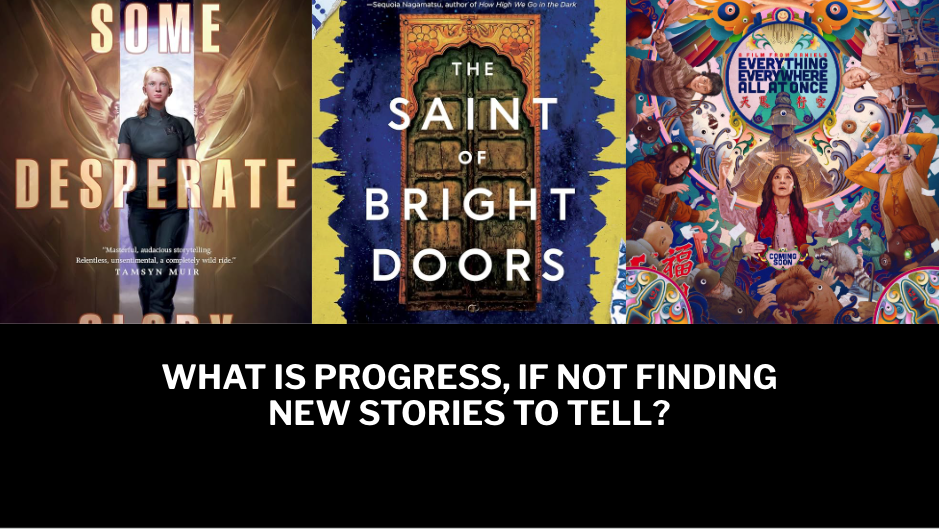
A few weeks ago, Emily Tesh won the Hugo Award for Best Novel for her wonderful book Some Desperate Glory, and her first words were, "Here is my hope for this book... I hope this book disappears." You can read that speech here, and I highly recommend it. (I was already working on this talk when I heard her say this, and it felt like wonderful synchronicity.)
Knowing that your art won't burn bright forever gives you permission to make something that speaks to a particular moment. You can create art that's foolish and strange — which is a longer way of saying, "You can make art".
I don't want to speak to people a hundred years from now. I don’t know those people! I want to speak to people right fucking now. Some Desperate Glory is a perfect example of art that's brazenly political and defiantly odd. So is The Saint of Bright Doors by Vajra Chandrasekere, which has swept a bunch of the major genre awards. I still can't quite believe that Everything Everywhere All at Once was a mainstream hit. What is progress, if not finding new stories to tell?
Of course I want to honor and respect all the people who came before, because we wouldn't be here without them. (Shoutout to Miss Major and Marsha P. Johnson!) But when I think about using creativity to help build a better future, I think in terms of creating something that blows my mind here and now.
It's a weird paradox: thinking less about posterity makes it easier to create something that shapes the future. I can't trust anybody who wants too badly to be taken seriously. Which brings me to...
2) No Gods, No Daddies, No Lone Geniuses
The counterpart to the Great Man Theory of History is this expectation that a great man is going to lead us forward. Some of the hungriest bottom-feeders in the world have seized on the archetype of the Smartest Man in the Room, as popularized by Tony Stark, House, Sherlock and certain iterations of Doctor Who.
And yeah, I prefer a future where everybody has good ideas to one where all the ideas are handed down from one fancy bitch.
In my creative life, I've seen over and over that one person who gets held up as the Innovator who created something single-handed. But when you look closer, you always find a whole scene that came together and invented something together, with this one person taking all the credit.
Being part of a community means learning from each other. One toxic thing about the Lone Genius is that he can never be wrong — and I fucking love being proved wrong. It was one of the best things about being a blogger, honestly. I'm never happier than when someone takes the time to explain to me why I'm full of shit.
Being proved wrong fills me with hope. It means there's stuff I don't know — which in turn means that despair is premature.
The people who are banning books want certainty. They want things to "make sense" according to a limited worldview, and they hate being wrong.
It's also no accident that there's a lot of overlap between the book banners and the folks who want to put artists out of work by using generative A.I. to "automate" creativity. The creative process is full of trial and error, and uncertainty, and being in dialogue with other artists, and it's antithetical to certainty and authority.
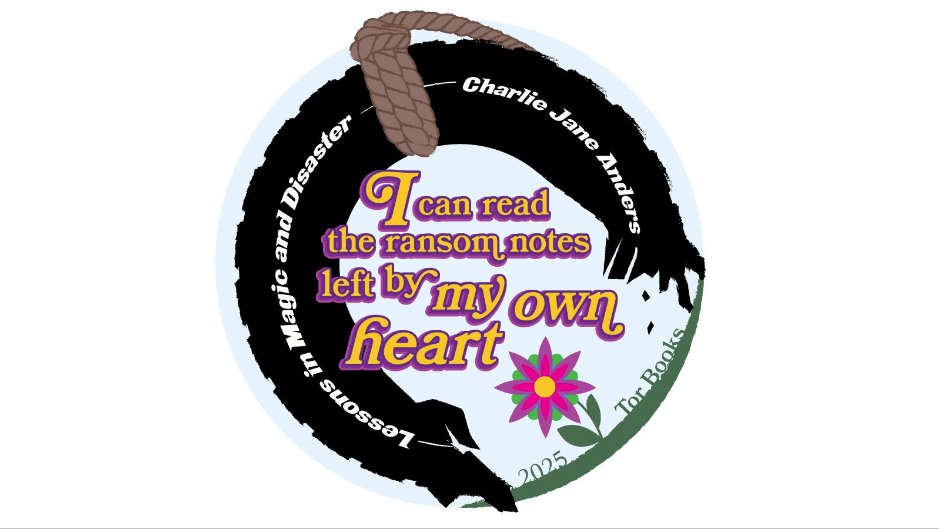
I have a novel coming out next year called Lessons in Magic and Disaster, and the main character is a grad student in literature. There's a theme running through the book that all of the things that give the world meaning are slowly being chipped away: art, journalism, libraries, creative writing, academia and education. Because powerful people don’t want us to be able to make sense of the world. At one point, my protagonist, Jamie, goes on a tirade in which she says, “The hardest things to talk about are the most important things to talk about.” And not everything can be quantified!
We need poets and artists, but we also need journalists and academics and theorists, and all of these things are communal pursuits where one person draws on the work of others. So we need change and uncertainty, but we also need to keep expanding the circle.
3) Community needs to keep becoming more inclusive
Are you welcoming more types of people and becoming more inclusive? That’s the single best metric for a community's health. Welcoming more people means having access to more ways of thinking about stuff, which means you get better ideas.
As an organizer, I think a lot about how to make more people with vastly different experiences feel at home in my events. At the Trans Nerd Meet Up, I'm a strong proponent of the idea that if you think you belong at this event, you do — because I've seen so many trans groups fall apart because the leaders tried to police who was "trans enough” or who was being trans the “right way.” I've been so happy to see non-binary people, bigender folks, agender folks, genderfluid folks and genderqueers coming under our umbrella. And there's still a ton of work to be done to center trans people of color in our spaces.
And as a writer, I think increasingly about how to represent people who've been left out of stories before now. For example, when I was a kid there were trans bodies in media, but openly trans creators weren't part of it. A friend of mine did a deep dive into the weirdly huge canon of trans women being made fun of in 1980s media — I'd somehow forgotten that Crocodile Dundee assaults a trans woman and it's played for laughs.
Things have gotten a bit better in mainstream media, but a massive backlash is having some effect, and we're reminded over and over again that our communities have to be the ones to support and uplift our stories, because we can't count on the mainstream to do it for us.
My hopeful visions of the future are all about dreaming up queer enclaves that thrive in the face of climate change and other disasters. I like writing about the people on the margins who take in strays, and about building alliances with other people who are fighting for liberation.
Sometimes expanding a community is a painful process. You have to let go of your fixed ideas about who belongs and who matters. You might also have to kick out a few people whose bad behavior stands in the way of greater inclusion. But these are just growing pains. Also, it shouldn't be all pain! There should be joy!
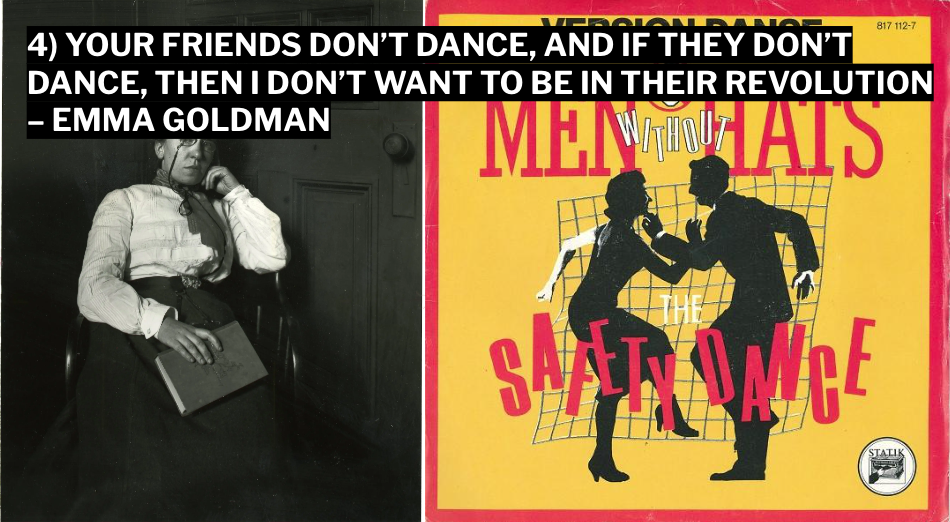
4) Let’s dance
Communities need fun and constructive weirdness.
I really can't get into a story where nobody ever has a good time. It's so easy, during a horrible scary moment, to see fun and sweetness as a unrealistic, or a betrayal — but it's unrelenting grimness that's unrealistic and pointless. I get bored with endless darkness. I get burned out. This is why I'm on Tumblr looking at The Owl House fan art, instead of getting hectored on ZombieTwitter.
Laughter gives us the strength face up to endless horrors. As a writer, my favorite scenes to write are the small moments where my characters get to have fun and reconnect, before they go off to fight the monsters or whatever.
In my party planning, in my writing, I want to bring you into spaces where you can recognize that nothing makes sense, and most of the things that people hold true are absurd — and that this means we can have a damn pillow fight and sing 1960s ad jingles at the top of our lungs.
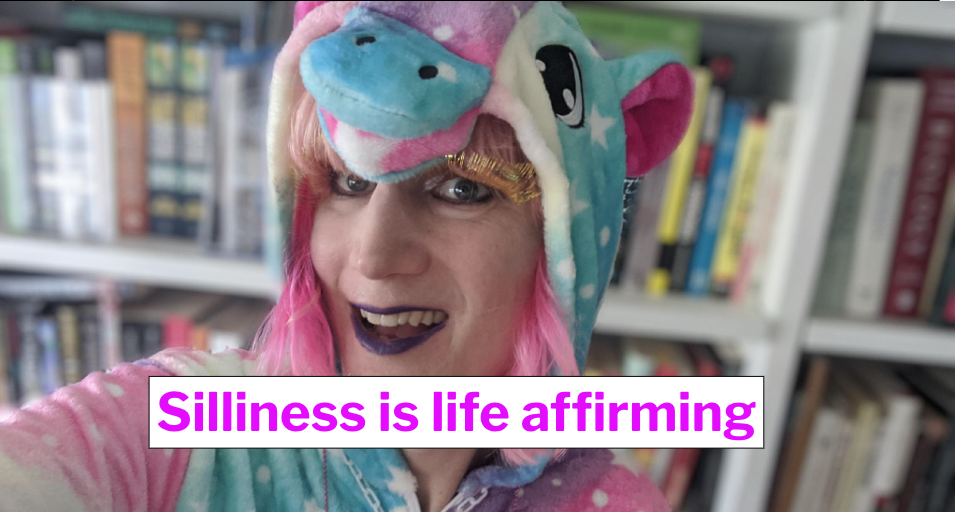
Silliness will set us free. Ridiculousness promotes social cohesion, because laughing together makes me feel closer to everybody. And it also pisses off the haters.
I want to end by talking about kindness, because kindness really is indispensible at a time when so many people are hurting. Human connection is what it's all about — it's the reason we're fucking alive. It's what's going to save us from all the shit-canoes that are preparing to pour molten shit on our heads. And connecting with other people is pleasurable, even though it's also hard. I don't trust any version of the future where we never rejoice.
I don't believe in utopias or dystopias, but I do believe in people taking care of each other.
So please take care of each other. Thank you.
Music I Love Right Now
A new Stevie Wonder song is cause for major rejoicing — can you believe it’s been nearly twenty years since he released an album? So I’m very chuffed about “Can We Fix Our Nation’s Broken Heart,” which came out a week or so ago. It’s a classic Stevie Wonder ballad with lyrics about healing our nation, and while I don’t love it quite as much as the pair of songs he released in 2020, “Where Is Our Love Song” and “Can’t Leave It in the Hands of Fate,” it still has all the melodic gorgeousness that you’d expect from Stevie Wonder, and it feels like a good addition to the speech he gave at the Democratic Convention.
My Stuff
Hey, there’s a pre-order link for Lessons in Magic and Disaster. I’m gonna start shouting about this book soon, but it’s my first adult novel since 2019 and it’s very much the book of my heart. A young witch teaches her mother magic, while also discovering the queer secrets behind a mysterious novel from 1749. Dark academia. Queer families!
Here’s an Eventbrite link for this Saturday’s Trans Nerd Meet Up.
Here’s the info for the Bookstore and Chocolate Crawl on Sept. 21.
I’ll have info about the Sept. 24 Writers With Drinks on the website probably later today.
Here’s a gift link for my latest book review column in the Washington Post.